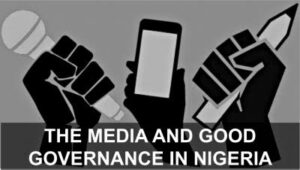The history of Nigerian government and the media

The history of Nigerian government and the media is a long and complex one, involving various political, social, and cultural factors.
The media in Nigeria has evolved from the colonial era to the present day, facing different challenges and opportunities along the way. Here are some of the key historical periods and events that shaped the Nigerian media and its relationship with the government:
The colonial era (1861-1960):
The British colonial government established the first newspaper in Nigeria, the Lagos Times, in 1880. It was mainly used to promote British interests and policies in the region. Other newspapers followed, such as the Nigerian Chronicle, the Nigerian Times, and the Daily Times. Some of these newspapers were owned or influenced by the colonial administration, while others were independent or opposed to colonial rule.
The first radio station in Nigeria, Radio Nigeria, was established by the British Broadcasting Corporation (BBC) in 1932. It was also used as a tool of propaganda and information by the colonial government.
The first television station in Nigeria, Western Nigeria Television (WNTV), was established by the Western Region government in 1959. It was the first television station in Africa and was seen as a symbol of regional autonomy and nationalism.
The post-independence era (1960-1999):
Nigeria gained its independence from Britain in 1960 and became a federal republic with a parliamentary system of government.
The media enjoyed a brief period of freedom and diversity, as new newspapers, radio stations, and television stations emerged. However, this period was soon interrupted by a series of military coups that plunged the country into political instability and civil war.
The military regimes that ruled Nigeria from 1966 to 1979 and from 1983 to 1999 imposed various forms of censorship, repression, and intimidation on the media. Many journalists were arrested, detained, tortured, or killed for criticizing or exposing the abuses of the military rulers.
Some media outlets were shut down, confiscated, or taken over by the government. The media became a battleground for political struggles and propaganda wars between different factions and interests.
The democratic era (1999-present):
Nigeria returned to civilian rule in 1999 after a long period of military dictatorship.
The media experienced a new wave of liberalization and expansion, as new laws and policies were enacted to protect press freedom and promote media pluralism.
The media landscape became more diverse and vibrant, with hundreds of newspapers, magazines, radio stations, television stations, and online platforms operating in the country. It played a crucial role in informing and educating the public about democratic processes and issues, such as elections, human rights, corruption, security, development, etc.
Also facing some challenges and threats in this era, such as political interference, economic pressures, ethical violations, professional standards, digital disruption, etc.
The history of Nigerian government and the media shows that the media has been both a partner and an adversary of the government at different times and contexts.
The have also been influenced by various factors such as culture, religion, ethnicity, ideology, etc. that shape its identity and role in society. The media in Nigeria is still evolving and adapting to the changing realities and expectations of its audience and stakeholders.


